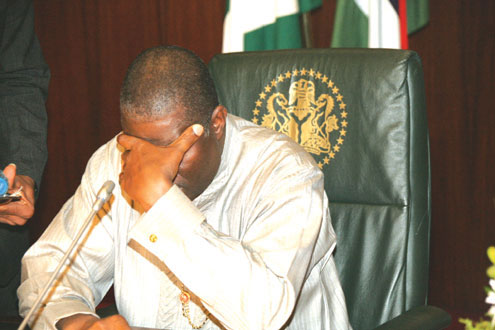More details have emerged from a new book on the 2015 General Elections which focused on the former president Goodluck Jonathan plotting his electoral downfall with some key decisions.
The book, “The Nigerian General Election of 2015,” has a number of frontline researchers and political analysts contributing to the book. Three leading professors of political science, namely John A.A. Ayoade, Adeoye A. Akinsanya and Olatunde J.B. Ojo conceived the idea under a Programme for Presidential Studies.
Basically, the contributors to the new book, The Nigerian General Elections of 2015, were drawn from academics, the media, civil society organisations, public institutions and research institutes with direct electoral duties during the 2015 elections.
In the last six years the erudite scholars initiated the programme five priceless books have been turned out. The books are: Nigeria’s Critical Election: 2011; The Jonathan Presidency; Nigeria: Descent into Anarchy and Collapse and The Jonathan Presidency: The Sophomore Year.
Among others, the new book empirically analysed voters’ turnout, voting behaviour, the roles of political parties, the defeat of the Peoples Democratic Party (PDP), the dilemma of the Independent National Electoral Commission (INEC) and factors that defined the victory of the All Progressives Congress (PDP).
The book x-rayed the strategic errors of the administration of Jonathan, which it argued, cost the Peoples Democratic Party, PDP and its presidential candidate fatal defeat that could have been avoided if some concessions were made.
The book explained that the presidential election was a particularly interesting one in which the former president was self-assured that he had done enough to deserve a renewal of his electoral contract with the Federal Republic of Nigeria.
According to the book, “Jonathan was challenged by Buhari, a veteran political war-horse. That was the fourth time Buhari presented himself for election to Nigeria. Some saw him as a habitual electoral failure or a serial loser while others saw him as a possible comeback kid.”
The book faulted Jonathan’s presidential campaign, which it described as a manual for aborting victory even though the former president had a political headstart being an incumbent against a serial loser that was widely perceived perpetually unelectable.
It observed that the incumbency advantage was neutralised by specks of electoral authoritarianism like the certificate crises and the postponement of election on spurious security grounds.
“The postponement of the election was perceived by a good percentage of the electorate as biased. It was meant to demoralize the opponents; overstretch their resources and get Goodluck Jonathan to outspend General Buhari,” the book said.

